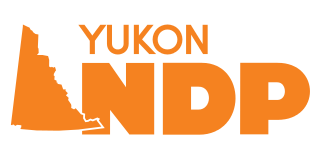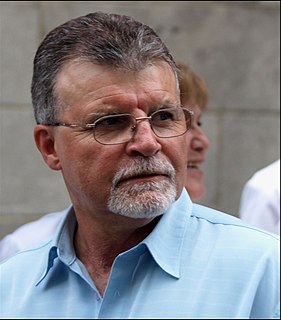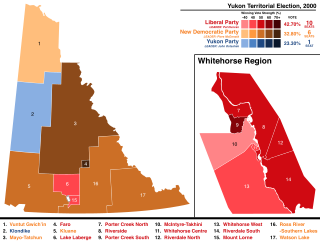
The Yukon New Democratic Party is a social-democratic political party in the Yukon territory of Canada.

Dennis G. Fentie, MLA is a Canadian politician. He was the seventh Premier of Yukon and leader of the Yukon Party, serving from 2002 to 2011, as well as the MLA for Watson Lake.

The Commissioner of Yukon is the representative of the Government of Canada in the Canadian federal territory of Yukon. The commissioner is appointed by the federal government and, in contrast to the Governor General of Canada or the Lieutenant Governors of the Canadian provinces, is not a viceroy and therefore not a direct representative of the Canadian monarch in the territory eo ipso.

The Legislative Assembly of the Northwest Territories, or Legislative Council of the Northwest Territories, is the legislature and the seat of government of Northwest Territories in Canada. It is a unicameral elected body that creates and amends law in the Northwest Territories. Permanently located in Yellowknife since 1993, the assembly was founded in 1870 and became active in 1872 with the first appointments from the Government of Canada.

The Yukon general election of 2000 was held on April 17, 2000 to elect members of the Yukon Legislative Assembly in the Yukon Territory in Canada. The incumbent NDP government was defeated by the Liberal Party who formed a majority government
The 1909 Yukon general election was held on 28 June 1909 to elect the ten members of the Yukon Territorial Council. The council was non-partisan and had merely an advisory role to the federally appointed Commissioner. The 1909 election marked the first time that voters in the territory elected the entire council — in the four prior elections, the council was composed of five elected representatives and five representatives appointed by the Canadian federal government.

The 1996 Yukon general election was held on September 30, 1996 to elect the seventeen members of the Yukon Legislative Assembly in Yukon Territory, Canada. The governing Yukon Party, a conservative party, was defeated by the social democratic New Democratic Party (NDP). The NDP formed a new majority government of the territory with 11 seats. Party leader Piers McDonald became Government Leader. The Yukon Party and the centrist Yukon Liberal Party each won three seats, although Liberal leader Ken Taylor failed to be elected.

The 1978 Yukon general election, held on November 20, 1978, was the first conventional legislative election in the history of Canada's Yukon Territory. Prior elections were held to elect representatives to the Yukon Territorial Council, a non-partisan body that acted in an advisory role to the Commissioner of the Yukon. Following the passage of the Yukon Elections Act in 1977, the 1978 election was the first time that voters in the Yukon elected representatives to the Yukon Legislative Assembly in an election organized along political party lines.
Richard Nerysoo is a territorial level politician from the Northwest Territories, Canada. He was a member of the Northwest Territories Legislature from 1979 to 1995 and served as the third Premier and Speaker.
Geraldine Van Bibber is a Canadian politician representing the Yukon electoral district of Porter Creek North as a member of the Yukon Party. She was elected as part of the 2016 Yukon election.
Watson Lake is an electoral district which returns a member to the Legislative Assembly of the Yukon Territory in Canada. The riding is one of the Yukon's eight rural ridings and is one of the oldest ridings in the Yukon.
Whitehorse West is an electoral district which returns a member to the Legislative Assembly of the Yukon Territory in Canada.

Hilda Pauline Watson was a Canadian schoolteacher and politician from the Yukon Territory. She was the first woman in Canadian history to lead a political party which was successful in having its members elected.

Kluane is an electoral district which returns a member to the Legislative Assembly of the Canadian territory of Yukon. It is named after Kluane National Park, which is within the riding. It is one of the Yukon's eight rural districts.
This article provides a timeline of elections in Canada, including all the provincial, territorial and federal elections. The information starts from when each province was formed or entered the Confederation, and continues through to the present day.
Mayo was an electoral district which returned an MLA to the Legislative Assembly of the Yukon Territory in Canada. It was created in 1928, at a time when it was one of three districts who elected advisors to the Yukon Territorial Council. The more contemporary, final iteration of the riding was created from an amalgamation of the riding with part of the riding of Klondike. It was abolished in 1992 when it was amalgamated with the riding of Tatchun to form the riding of Mayo-Tatchun.










